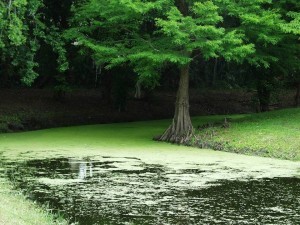Beginning New Year’s Day of 2014, a new law went into effect that state lawmakers, environmental advocates, and lawn care professionals hope will reduce Florida’s decades-long problem with stormwater runoff pollution. The law states that all lawn care professionals applying fertilizer as part of their business must pass a Green Industries Best Management Practices (GI-BMP) test and receive a certification commonly referred to as a “fertilizer license.” The Florida Departments of Agriculture and Consumer Services and Environmental Protection maintain the records and regulatory authority over these licenses.

Lawn care service providers applying fertilizer to Florida landscapes are now required to complete best management training. Photo credit: UF IFAS
Fertilizer becomes a problem in the environment when either too much is applied or it is used at the incorrect rate or wrong time. Rain or irrigation water can move these nutrients (remember, fertilizer is mostly composed of nitrogen, potassium, and phosphorus) off target, leaching them into the soil and groundwater or running off into surface waters.
Once in a creek, lake, river, or bay, this fertilizer intended to improve growth of turf or landscape plants instead fuels the growth of algae. In certain conditions this causes eutrophication, an overabundance of algae growth which gives water bodies a green, scum-covered appearance. As this plant material eventually breaks down, it uses up oxygen in the waters below, reducing the amount available for fish and other aquatic species. These scenarios can lead to fish kills and reduced water quality.

A body of water receiving excess nutrients can turn green and unhealthy from too much algae growth. Photo Credit: UF IFAS FFL program
The new legislation encourages professional lawn care staff to take a day-long course covering these concepts, and additional topics such as irrigation, pest management, and proper landscaping practices. The course, offered online and in every UF IFAS Extension office, prepares the audience for the test and certification, and gives useful tips and information for their everyday work.
Several counties, most recently Escambia, have passed local ordinances echoing the requirement to have this license when seeking a business tax certification to operate a lawn care service (providing fertilizer) in the county. In addition, local ordinances typically have a “prohibited application period,” which may involve a particular time of the year or weather condition. The ordinances also restrict blowing or sweeping lawn debris into storm drains, which can cause the same water quality problems as excess fertilizer. Visit the GI-BMP website to learn more about the program, and if you, friends, or neighbors use a professional lawn care service to fertilize your lawn, be sure to ask for proof of their fertilizer license.
- Hurricane Season 2025 - July 7, 2025
- The Striped Burrfish - April 11, 2025
- The Value of Biodiversity - March 28, 2025
